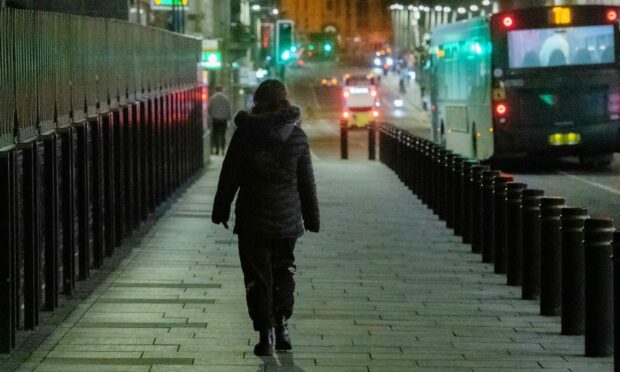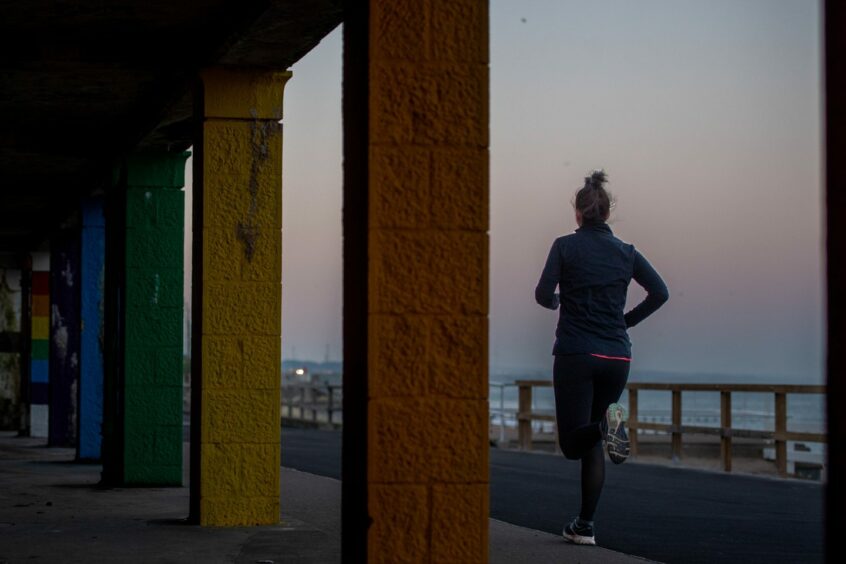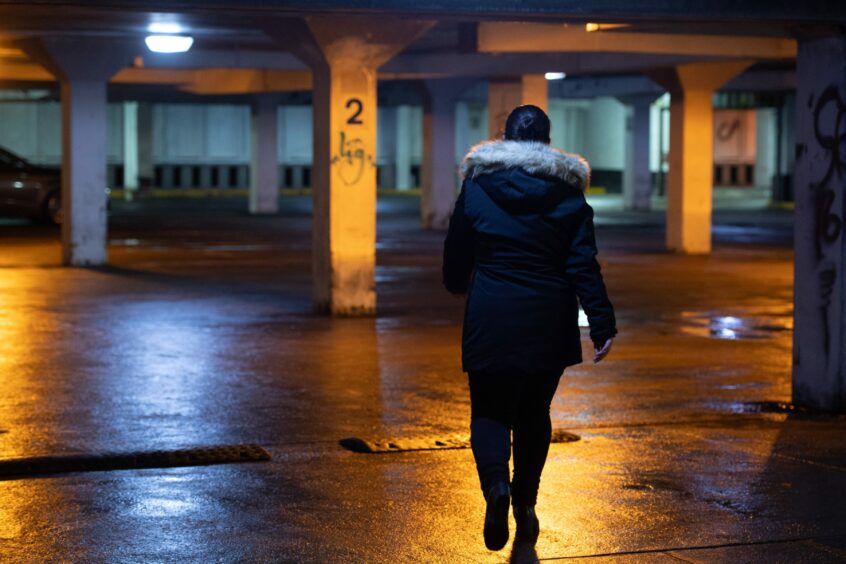A staggering 90% of women feel that simply being a woman affects their personal safety in Aberdeen, according to a new survey by The Press and Journal.
Hundreds of readers have taken part in the detailed questionnaire about their experiences of going out in the city.
The results paint a picture of the city that many people, women in particular, find unsafe and threatening.
The city centre was highlighted as the place where you’d most likely encounter trouble, including stalking, unwelcome touching and anti-social behaviour.
Around three-quarters of respondents (74.7%) – 82.7% female, 59.3% male – said they don’t feel safe while out in Aberdeen alone at night and drunken behaviour appeared to be the biggest concern.
Survey results from 452 residents or regular visitors to Aberdeen – nearly 63% identifying as female and just over 34% male – have revealed where people don’t feel safe and the reasons why.
The survey was carried out by DC Thomson’s in-house Insight team between December 9 2022 and January 3 2023.
The figures show 86.6% of those polled – 89.5% female, 80.9% male – are avoiding areas to stay safe.
Just over a quarter of men (27.3%) felt that their gender affects their own personal safety in the city, compared with 90% of women.
Is Aberdeen safe?
The survey has also uncovered a worrying number of people who’ve experienced disturbing behaviour, most commonly in the city centre.
Around four in ten (40.9%) have been followed or stalked, with a similar number of 137 people being on the receiving end of unwelcome touching (40.7%).
A total of 45.7% of participants recalled experiencing unwelcome sexual advances.
And other common occurrences have included people being leered/stared at (69.7%), sexual comments/jokes (58.5%), and being catcalled or wolf-whistled (57%).
Among the top settings in which people said they feel most vulnerable at night, public transport was the most common worry.
Almost three-quarters (74.3%) – 81.5% female, 60% male – said they feel “not very safe” or “not at all safe” when alone at night “on or waiting for public transport/taxis”.
Other places or activities also ranking high on the list were car parks (69.9% – 79% female, 52.2% male), walking around neighbourhoods (59.9% – 66% female, 47% male), exercising outside (58.2% – 67.6% female, 37.4% male) and pubs/nightclubs (55.2% – 57.6% female, 47.8% male).
When respondents were asked what contributes to them feeling unsafe when out and about in Aberdeen city, they replied that they are most uneasy about drunken behaviour (78.6% – 80.6% female, 76.8% male), as well as poor street lighting (68.7% – 72.4% female, 64.3% male), fear of mugging (65.1% – 67.2% female, 61.6% male), drug dealing (59.4% – 59.5% female, 59.8% male) and being alone (55.5% – 65.9% female, 35.7% male).
Approximately seven in ten survey participants (70.4%) – 69.4% female, 75.0% male – also quoted a lack of visible police presence as a cause of feeling unsafe.
Reacting to the survey results, Police Scotland said it “welcomes all feedback and insights”.
Superintendent Neil McDonald, of the north-east division, told The Press and Journal that there is an “effort to deter, detect and divert crime and anti-social behaviour”.
He added: “Aberdeen has a busy and welcoming city centre and our policing teams are dedicated to ensuring its safety – working with partners from the local authority, retail, hospitality and third sectors.
“Furthermore, our high visibility Safer City Unit has the bespoke remit to address city-centre quality of life issues with enforcement and disruption as a key focus.
“Police services across the UK are under intense scrutiny and we are realistic about the challenges ahead.
“However, I can provide every assurance that keeping people safe is at the heart of what Police Scotland does.”
One person, who shared her views anonymously with the survey, described the city centre of Aberdeen as “dicey”.
She explained: “I have been sexually assaulted on a crowded dance floor on a night out.
“I was also physically and verbally abused while waiting for a bus. Another time, when I was waiting for a taxi at the rank, I received verbal abuse.
“On Union Street, I was attacked while waiting for a bus. Anywhere in the city centre is dicey.”
Another woman – who’s concerned about the level of safety in Mastrick, Northfield, Stockethill and Torry – said that she had been attacked and now avoids groups of youngsters.
Avoiding areas, changing behaviour
Others have spoken of avoiding areas or changing their behaviour to stay away from potential trouble.
“I work at the end of Union Street, I outright refuse to walk down Union Street after dark. I’ve experienced harassment first-hand,” one told The Press and Journal.
Another added: “I work at Castlegate and live at Denburn, so, while walking home late at night, I avoid the darker streets.
“I don’t go along the side of Boots and I don’t go down the steps at His Majesty’s Theatre. I also avoid Belmont Street when it’s very busy with drunk people.
“Groups of drunk youths and intoxicated men walking about on their own make me feel unsafe.”
A woman who said she had previously been followed up George Street told the survey she walks around the city with the phone number 999 keyed into her mobile, ready to ring for help if she suddenly needs it.
A 39-year-old bar steward who lives in Rosemount and works at Castlegate echoed the many voices singling out drunken behaviour as one of their biggest safety concerns.
“I’ve had quite a lot of abuse shouted at me by drunk youths when I’ve been walking home because I’m quite a noticeable gay female.
“It was just rowdy people that I’ve passed in the street. I didn’t feel safe and I feared that I would be on the receiving end of violence.
“They’re unpredictable. You don’t know what they’re going to say or do. It makes me feel very anxious.
“Normally, I’d just want to cross the road because I wouldn’t want to pass them.
“Drunk people have been abusive, unkind and offensive to me walking down the street with my partner loads of times.
“We’ve had abuse shouted at us both. It makes you worried about what they’re going to do if they come over.
“There are never any police around. I don’t even think that they would bother to do anything about it.
Council responds to Aberdeen safety survey
An Aberdeen City Council spokesman said: “We take the safety of women and indeed all our residents seriously.
“Working with Aberdeen Inspired, Police Scotland and other key partners, we became – in 2014 – the first city in Scotland to be awarded Purple Flag accreditation for promoting a safe and secure nighttime economy.
“We are now in our eighth year of accreditation thanks to this strong partnership approach.”
Cities can earn Purple Flag status, part of an international accreditation programme, if they meet a comprehensive set of standards.
Those awarded the accreditation must evidence particular management processes and demonstrate examples of good practice in running city centres safely and successfully.
The process is similar to the Green Flag award for parks and the Blue Flag for beaches.
Purple Flag holders meet or even exceed certain standards of excellence in managing the evening and nighttime economy.
Adrian Watson, the chief executive officer who leads Aberdeen Inspired Business Improvement District said there is ongoing work to overcome “challenges”.
He said: “Aberdeen Inspired is committed to working with Police Scotland, Aberdeen City Council, NHS Grampian, The Street Pastors and a host of other partners in ensuring our city centre remains one of the safest of its kind in the country.
“My organisation is delighted to lead the wider partnership on the Purple Flag accreditation in this field, which the city centre has now held for nine consecutive years – unprecedented in Scotland.
“Of course there are challenges, but we will continue to work with other agencies, our businesses and the wider public in making the city centre a safe and welcoming experience for all.”
If you would like to discuss the findings of our survey or share your own experiences please email our reporter Bryan Rutherford at bryan.rutherford@pressandjournal.co.uk.
Credits
Words by Bryan Rutherford
Insight by DC Thomson IDA team
Data visualisations by Emma Morrice
Images by Kami Thomson
SEO by Jamie Cameron



